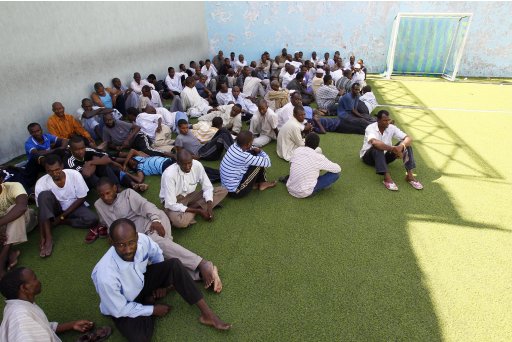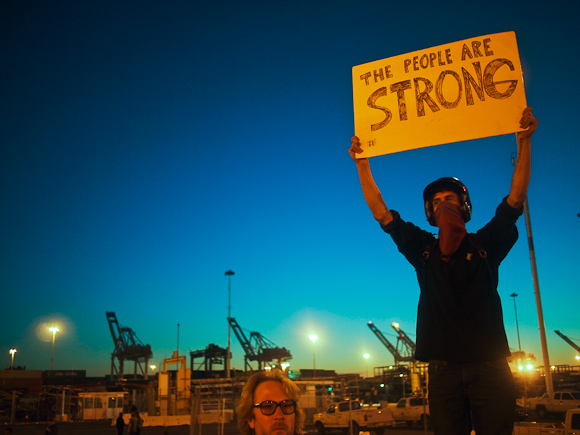
October 30, 2011 -- Ecosocialists Unite -- Hugo Blanco led a successful peasant revolution in Peru for land rights in 1961 when peasants were being killed by landowners. Praised by Che, Blanco -- then a leader of the Fourth International -- was captured and placed on death row. He lived due to an international campaign of solidarity launched by figures like Jean-Paul Sartre.
Now in the his late 70s, he publishes Lucha Indigena ("Indigenous Struggle"). The uprising in Peru of the Awajan and Wampis and other Amazon people, of the Aymara and Quechua, have shown that Indigenous and workers can organise to challenge the destruction of the Earth and to build a democratic alternative to capitalism.
Hugo Blanco argues that the revolution must be global and that the Occupy movement shows that people in the global North are joining the revolt against the 1% and for a democratic, ecological society for the 99%.
This Lucha Indigena editorial on the occupy movement and the global fightback against neoliberalism has been roughly translated by Derek Wall and Martin O'Beirne.
* * *
'Build a future which reflects our dreams' -- Angela Davis addresses Occupy Wall Street
Author, activist and member of the Committees of Correspondence (former Communist Party USA) Angela Davis spoke at Occupy Wall Street in Washington Square Park, New York City, on Sunday, October 30, 2011. See video of her Q&Aperiod below.
"We say no to big banks. We say no to corporate executives making millions of dollars a year. We say no to student debt, we say no to evictions. We say no to global capitalism. We say no to the prison industrial complex. We say no to racism, we say no to class exploitation, we say no to homophobia, we say no to transphobia, we say no to ableism. We say no to military occupation. We say no to war ...
For more reports on the Occupy movement, click HERE.
Alternet -- Angela Davis, professor, thinker, activist, famed revolutionary, visited New York's Occupy Wall Street movement on Sunday afternoon. She spoke first to a densely packed crowd seated on cold concrete at Washington Square Park, her talk over the People's Mic sounding like a litany.
Is democracy the enemy? A reply to Slavoj Zizek

Slavoj Zizek addresses Occupy Wall Street.
By Louis Proyect
Libya: NATO's war feeds ugly violence

Amnesty estimated up to half those detained were migrant workers from Sub-Saharan Africa, who have been persecuted since the beginning of the conflict over spurious allegations that they served Gaddafi as mercenaries.
By Tony Iltis
October 31, 2011 -- Green Left Weekly -- The October 23 declaration of Libya’s “liberation” by the National Transitional Council (NTC), the de-facto government since taking Tripoli from former dictator Muammar Gaddafi on August 21, was a showcase victory for the West’s vision of how the Arab democratic awakening should progress.
An uprising began in Libya on February 17 — part of the popular rebellion that has broken out against dictatorial regimes across the Arab world. The Gaddafi regime's brutal repression — carried out with Western-supplied weapons — meant the rising turned into a civil war.
By March 17, with the regime's forces preparing to attack the rebel-held eastern city of Benghazi, a NATO intervention was sanctioned by a UN Security Council resolution in the name of protecting civilian lives.
Biography uncovers forgotten lessons of Sri Lanka’s JVP
Review by Ben Courtice
Annie Leonard on 'stuff', carbon trading and Occupy
October 27, 2011 – Green Left Weekly/
Who’s causing the environmental crisis: 7 billion or the 1%?

October 26, 2011 -- Grist via Climate and Capitalism, posted at Links International Journal of Socialist Renewal with permission -- Ironically, while populationist groups focus attention on the 7 billion, protesters in the worldwide Occupy movement have identified the real source of environmental destruction: not the 7 billion, but the 1%
This article, published today on the environmental website Grist, has provoked a vigorous discussion there. Many of the comments defend variations of the “consumer sovereignty” argument, that corporations only destroy the environment in order to provide the products and services consumers demand. We encourage readers to join that conversation.
* * *
By Ian Angus and Simon Butler
The United Nations says that the world’s population will reach 7 billion people this month.


